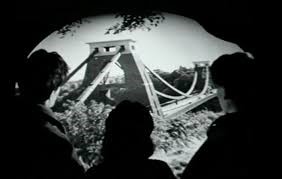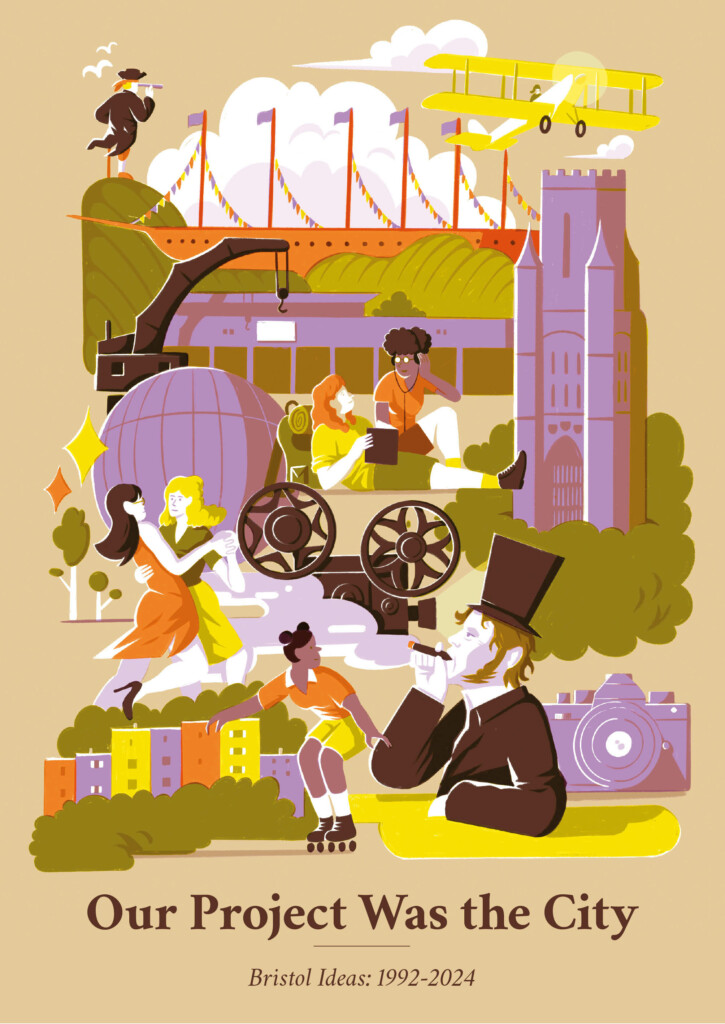The Rise and Fall of the Bristol Renaissance ACH Smith

Share this
Screengrab from The Newcomers, the TV series that Smith writes about here. It’s an important programme as it shows Bristol in the early 1960s, features Tom Stoppard and Bristol artist Derek Balmer, and includes film of the first non-white bus conductor following the Bristol bus boycott, Raghbir Singh, as well as Alison and ACH Smith and their Bristol.
Bristol Ideas had a long relationship with novelist, playwright and poet ACH Smith. His play Up the Feeder, Down the Mouth (2001), provided one of the most magical moments in theatre in the city in recent decades. The Newcomers – the BBC series he refers to here – has been influential in our work. We showed this twice, to full houses. Smith was also a mentor, providing informal advice on Bristol in the 1960s, a period he reflects on here as he looks at the city and the arts over the past six decades. The environment for public funding for culture then was as challenging as it is now.
Andrew Kelly emailed me in 1995 for suggestions for memorial plaques to significant artistic figures in Bristol’s history. I offered a few thoughts but finished with: ‘One plaque at Temple Meads could cover them all, though. It might read: “The City of Bristol, always pleased to see the back of artists”.’ O tempora, o mores, as we say in Redland. I could not imagine what was to follow. Andrew’s brainchild, the Festival of Ideas, cherried a cake that was already baking in Bristol. I’ve opened this paragraph pretentiously, so I’ll finish it by describing the past six decades as a Bristol Renaissance.
I’d credit its inauguration to Richard Hawkins, a composer and the Managing Editor at the Bristol United Press. In 1960, I was working at the Western Daily Press (WDP). Seeing how the posh national papers had started to splash arts coverage, Hawkins judged that there would be a ready audience for it in Bristol, and invited me to edit a weekly arts page, broadsheet size in those days. ‘Oh,’ he said, ‘and there’s a local journalist called Tom Stoppard who might be a useful contributor.’ Stoppard and I had met once and hadn’t liked the look of each other, but the first piece he submitted was a brilliant analysis of the nouvelle vague in French cinema: Godard, Truffaut, Belmondo, Moreau, all that. Stoppard has since admitted to me that he’d cribbed this from Cahiers du Cinéma. We were soon close buddies; he was best man at my wedding. We ran the arts page jointly, and it survived for more than two years until the WDP editor, who hated it, saw that Hawkins would soon be on his way elsewhere and demolished it. Some years later, Patrick Dromgoole at HTV invited me to reincarnate the page in TV form and it ran monthly for 20 years.
In one of our special single-issue pages, Stoppard and I surveyed the city’s meagre provision for the arts (which entailed less outlay than was spent on the upkeep of the Lord Mayor’s ceremonial horses) and proposed the formation of a Bristol Arts Trust. To our surprise we fluttered the civic dovecots. Overnight, three committees – academics, businesspeople and trades unionists – came into being to promote the idea. That every regional centre should run its own arts budget is a case I have been arguing ever since. That is how it’s done in France and Germany, and it is what the Arts Council, before it became a canting bureaucracy, had in mind when Stoppard and I ran with it. Then, there was such a swell of support for it in Bristol that it became a Lord Mayor’s motion (a rare thing, by tradition unopposed). It was referred to the finance committee for implementation. They dug a hole and buried it. Hawkins told me that the ground of disagreement was that Labour councillors did not like the seating arrangement at the crucial committee meeting. Thirty years later, the City Council came up with a proposal to support the arts: form a Bristol Arts Trust. It got nowhere.
But something was stirring in the city. To the mood music of the Swinging Sixties, Jeremy Rees opened the Arnolfini in The Triangle; the Arts Centre (now The Cube) was created in King Square by the Workers’ Educational Association (shepherded by the developer Billy Poeton); and at the University of Bristol, where playwright John Arden was the resident Fellow in Drama, the academic George Brandt turned the drama department’s little theatre into an avant-garde studio. This is where Pinter and Stoppard were clapped by their first ever live audiences, and Alan Dossor, later director of the Liverpool Everyman, learned his craft.
Additionally, Charles Wood and Peter Nichols were writing their first plays, with scant support from the Bristol Old Vic. After Lawrence of Arabia, Peter O’Toole came back to storm through three Bristol Old Vic productions. Arnold Wesker brought his trades-councils-focussed Centre 42 festival here; one of the many performers was acclaimed writer Angela Carter, then living in Clifton. Derek Robinson’s first novel, Goshawk Squadron, was shortlisted for the Booker Prize: one of the judges, Saul Bellow no less, said it should have been the winner. John Boorman was vivifying the BBC’s documentary unit with Citizen ’63, a series about uncelebrated local people who caught his interest, followed by the first big thing on the newly launched BBC2: a six-parter about Bristol, The Newcomers. My wife Alison, myself, Stoppard and the painter Derek Balmer were the protagonists, TV rookies all of us. As well as Balmer, Paul Feiler, David Inshaw and George Tute who were emerging as artists of national interest.
The buzz went on through the century: Aardman, Banksy, Watershed, Massive Attack, the Tobacco Factory (created by George Ferguson, and distinguished by Andrew Hilton’s nationally acclaimed annual Shakespeare productions), many smaller companies and venues, and a stream of young actors at the Bristol Old Vic Theatre School performing for us here and going on to celebrity, a chance to ‘spot the coming man before he’s come’ as the critic Cyril Connolly (was it?) said. The cultural Renaissance had the potential to bring immense economic benefit. All over the country, you meet people who saw Bristol as a great location to start a business. But two things were lacking.
With the best will in the world – which has occasionally glinted through in a councillor like Estella Tincknell – support from the city council has been hobbled by Westminster’s chronic impoverishment of local government. The promotion of ‘levelling-up’ is face powder. Andy Hay, the most public-spirited director the Bristol Old Vic has had, resigned in despair in 2001 at the tepid backing the council afforded him.
The other thing missing was what in ancient Athens was called ‘the agora’: a place where creatives and audiences could meet and discuss, learn, and ‘argufy’ (critic William Empson’s word). In 2005, hallelujah, we got one: the Festival of Ideas. Masterminded by Andrew Kelly and a devoted staff, it lured hundreds of speakers, some world-famous, to come and share their thinking with us, and the loss of four Andrews – Kelly, Hay, Hilton, and the death of Andy King, the genius behind the Industrial Museum, now M Shed – have been grievous for the city we love, a misfortune for which Oscar Wilde would have found a witty phrase. I’ll settle for: it may be time to think again about that plaque at Temple Meads. I’ll pay for the screws.
ACH Smith has written over 20 plays and screenplays, including Up the Feeder, Down the Mouth and Walking The Chains. He has also published a dozen novels, poetry, and several non-fiction books including Wordsmith. He has written and presented some 200 programmes for HTV and BBC

This essay is taken from Our Project Was the City: Bristol Ideas 1992-2024, published May 2024.